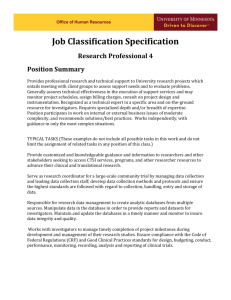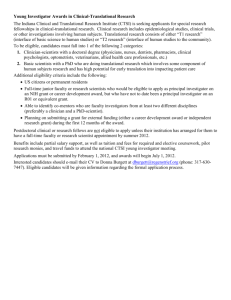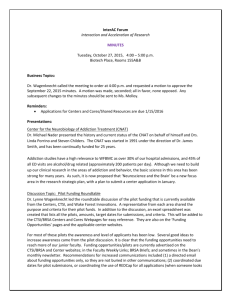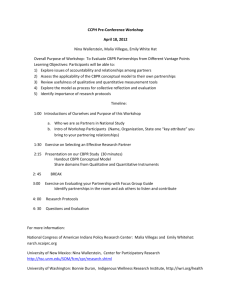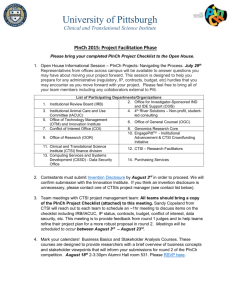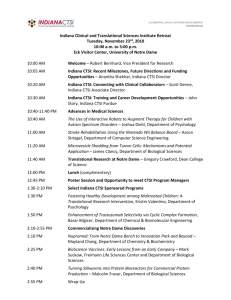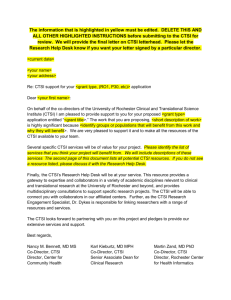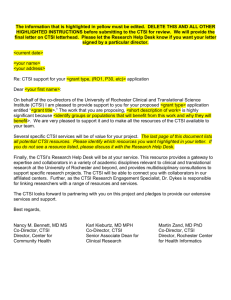CLINICAL AND TRANSLATIONAL SCIENCE INSTITUTE
advertisement
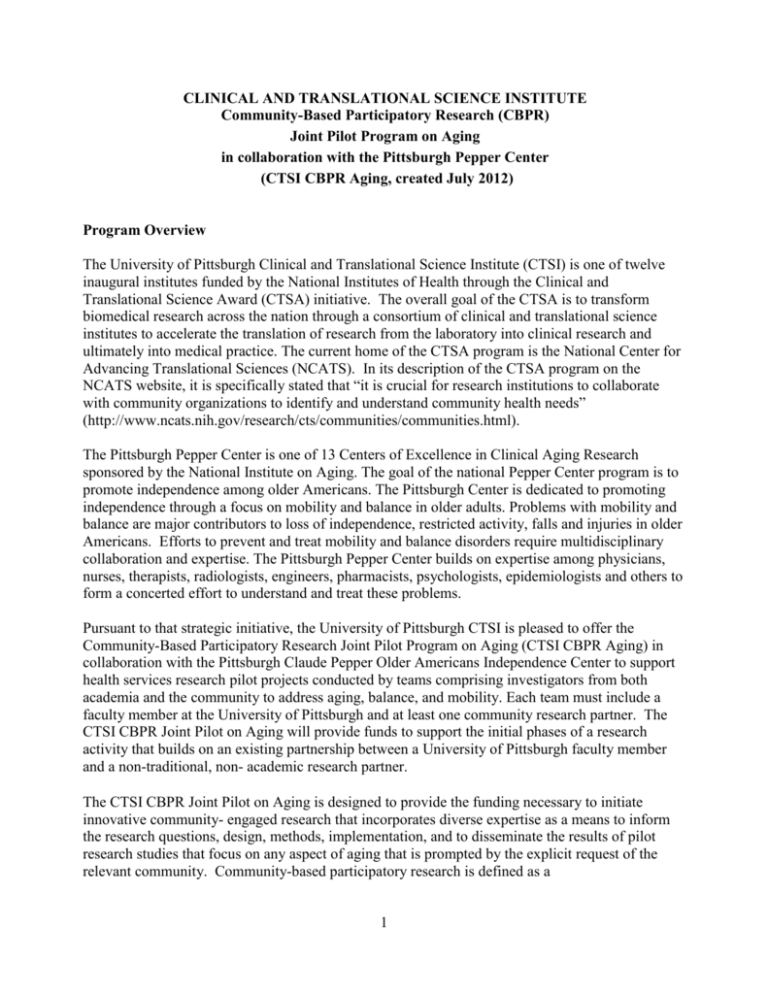
CLINICAL AND TRANSLATIONAL SCIENCE INSTITUTE Community-Based Participatory Research (CBPR) Joint Pilot Program on Aging in collaboration with the Pittsburgh Pepper Center (CTSI CBPR Aging, created July 2012) Program Overview The University of Pittsburgh Clinical and Translational Science Institute (CTSI) is one of twelve inaugural institutes funded by the National Institutes of Health through the Clinical and Translational Science Award (CTSA) initiative. The overall goal of the CTSA is to transform biomedical research across the nation through a consortium of clinical and translational science institutes to accelerate the translation of research from the laboratory into clinical research and ultimately into medical practice. The current home of the CTSA program is the National Center for Advancing Translational Sciences (NCATS). In its description of the CTSA program on the NCATS website, it is specifically stated that “it is crucial for research institutions to collaborate with community organizations to identify and understand community health needs” (http://www.ncats.nih.gov/research/cts/communities/communities.html). The Pittsburgh Pepper Center is one of 13 Centers of Excellence in Clinical Aging Research sponsored by the National Institute on Aging. The goal of the national Pepper Center program is to promote independence among older Americans. The Pittsburgh Center is dedicated to promoting independence through a focus on mobility and balance in older adults. Problems with mobility and balance are major contributors to loss of independence, restricted activity, falls and injuries in older Americans. Efforts to prevent and treat mobility and balance disorders require multidisciplinary collaboration and expertise. The Pittsburgh Pepper Center builds on expertise among physicians, nurses, therapists, radiologists, engineers, pharmacists, psychologists, epidemiologists and others to form a concerted effort to understand and treat these problems. Pursuant to that strategic initiative, the University of Pittsburgh CTSI is pleased to offer the Community-Based Participatory Research Joint Pilot Program on Aging (CTSI CBPR Aging) in collaboration with the Pittsburgh Claude Pepper Older Americans Independence Center to support health services research pilot projects conducted by teams comprising investigators from both academia and the community to address aging, balance, and mobility. Each team must include a faculty member at the University of Pittsburgh and at least one community research partner. The CTSI CBPR Joint Pilot on Aging will provide funds to support the initial phases of a research activity that builds on an existing partnership between a University of Pittsburgh faculty member and a non-traditional, non- academic research partner. The CTSI CBPR Joint Pilot on Aging is designed to provide the funding necessary to initiate innovative community- engaged research that incorporates diverse expertise as a means to inform the research questions, design, methods, implementation, and to disseminate the results of pilot research studies that focus on any aspect of aging that is prompted by the explicit request of the relevant community. Community-based participatory research is defined as a 1 "collaborative approach to research that equitably involves all partners in the research process and recognizes the unique strengths that each brings. CBPR begins with a research topic of importance to the community, and has the aim of combining knowledge with action and achieving social change to improve health outcomes and eliminate health disparities." (Community Campus Partnerships for Health, 2009) For examples of CBPR partnerships, please refer to the Agency for Healthcare Research and Quality 2004 Report, “Community-Based Participatory Research: Assessing the Evidence” as well as the Community Campus and Partnerships for Health (CCPH) website at http://www.ccph.info/. An expected product of this pilot program is the development of a documented framework describing the relationships between the community and academic partners that illustrates the collaborative elements, resources, areas of research and practice-based capacity, and future expectations of the newly formed interdisciplinary research relationship. Application Deadline Applications to the CTSI CBPR Joint Pilot on Aging are due no later than noon, September 17, 2012. Budget Information Please note: Funds are available to support one $25,000 award. The project funding period will be up to eleven months. Funds for the CTSI CBPR Joint Pilot on Aging awards may be used to cover project effort of investigators (academic and community), research staff, supplies, research participant compensation or reimbursement, or for other purposes directly related to the conduct of the research. The funds awarded will support direct costs only; no indirect support will be provided. For University of Pittsburgh investigators, please note that investigator effort is required and must be reflected on the budget page. If salary support is not requested, effort must be costshared by the department or other University entity that will support such effort. See below for more information. Please note when planning budgets that requests for no-cost extensions (carryovers) are unlikely to be approved. Applicants will be notified within four weeks of submission whether or not their application will be funded. If the necessary Institutional Review Board (IRB) protocol approvals are in place at the time of notification, the starting date for the award will be within two weeks of that notification. In any case, the starting date for the award will be no later than six weeks after investigator notification, independent of whether necessary protocol approvals are in place. Please note, however, that funds cannot be expended for any part of the research that is governed by an IRB protocol until that protocol has been approved. Also please note that the source of funding for the CTSI CBPR Joint Pilot on Aging is the Clinical and Translational Science Award (http://www.ctsaweb.org/) with funds provided by NCATs. Thus, any salary support requested in a submitted budget should reflect federal fringe benefit rates. If a CTSI CBPR joint pilot award is made, a budget meeting will be held with 2 participation from the principal investigators, the research administrator representing the academic investigator, the individual from the community partner who has responsibility for budgetary activities, and financial administrators from the CTSI. If necessary, minor adjustments to the requested budget will be made at that meeting. All items requested in the proposed budget must be explicitly documented. Should an award be made, requests for deviations from the proposed budget will be considered, but they may be rejected. Thus, the budget submitted with the application should be well-crafted and correspond directly with the priority for expenditures that is commensurate with the proposed research. The CTSI recognizes that the budget and expenditure processes for this program may not have the flexibility that accompanies some CBPR activities. Within the constraints of federal and state law and University regulations, all efforts will be made to support the proposed activities, but adherence to law/regulation may not allow the flexibility requested by investigators. Eligibility To be eligible for a CTSI CBPR grant, a project must involve collaboration between at least one University of Pittsburgh investigator and at least one non-traditional Community-Based Research Partner (CBRP). The academic partner and the CBRP must be able to illustrate the capacity to engage in the proposed research effort. The CBRP entity may be a community-based service organization, a school, or a faith-based institution, for example. Other nonprofit organizations that serve a population with an under-served health care need may also be eligible. University of Pittsburgh faculty members at the levels of assistant/research assistant professor, associate/research associate professor, and professor/research professor are eligible to apply as principal investigators to the CTSI CBPR program. Instructors, research associates, fellows, and postdoctoral researchers are not eligible to serve as primary investigators, nor are investigators from other institutions. Application Process The application must include the following items: I. Cover sheet The first page of the application must be a cover sheet that gives the title of the proposed project; the name, degree, academic title, primary departmental affiliation, and contact information (telephone number, fax number, and e-mail address) of the academic partner or partners; and the name of the community-based organization that will serve as the CBRP along with the name and contact information (telephone number, fax number, and e-mail address) for the individual who will serve as the single point of contact for that CBRP. Both the academic investigator(s) and the CBRP contact person must sign the cover sheet. If no salary support is requested for the University investigator, both the investigator and his/her department chair or appropriate responsibility center director (e.g., division chief or institute director) who can authorize cost sharing against an Entity-02 or -04 institutional account must 3 sign the cover sheet. These signatures certify acceptance of principal investigator’s cost shared effort and no indirect cost. The appropriate institutional account number against which the effort will be charged must also be provided. If the project is funded, cost shared effort must be reflected on the SPAR document and copies of the relevant SPAR must be provided to the CTSI administration upon request. II. Research Plan The research plan may not exceed five single-sided pages. It should include: • A description of the relevant backgrounds of both the University of Pittsburgh investigator and the Community-Based Research Partner investigator (not to exceed 200 words per investigator); • A description of the pilot project (including specific aims, background and significance, and research design and methods); • A description of the formative research activities, designed to establish and cultivate a research plan to address the community health concern; and • A description of how preliminary data and/or the newly-established interdisciplinary research capacity will be used in a grant application to an extramural agency in the future, including a description of the overall aims and a broad overview of the methods of the future grant application. The Bibliography must not exceed one single-sided page: it is not included in the five-page limit to the research plan. III. Biographical Sketches and Support Pages The NIH-format biographical sketch (see page I-71 of the SF424 Application Guide, updated July 25, 2011, http://grants.nih.gov/grants/funding/424/index.htm) and the NIH-format Other Support document (see page III-8 of the SF424 Application Guide) must be included for both investigators. The personal statement in each biographical sketch should be appropriate for the research proposed in the pilot program application. If a further update to the SF 424 Application Guide is extant at the time of application submission, the biographical sketch and other support information should conform to the “Instructions for a Biographical Sketch” and the section on “Other Support Information” in the updated Guide. While these documents would be preferred for the CBRP point of contact and the CBPR lead investigator, if these are not a single individual, it is recognized that these documents may not be appropriate for the CBPR participants. In any case, a biographical sketch for the CBRP point of contact and for the CBPR lead investigator must be included, and it must contain information about all post-high school education and job history, and summarize activities relevant to the proposed pilot project. IV. Budget and Budget Justification The NIH-format budget page (PHS 398 Form 4; revised June 2009, http://grants.nih.gov/grants/funding/phs398/phs398.html) must be used (later revisions are also acceptable). An additional page should be included for the budget justification; any pieces of equipment must be explicitly justified as critical to the performance of the proposed research. If computers are requested as part of the budget, they must be explicitly justified in the context of the pilot project. This justification will be critically reviewed and approval of computers is not automatic. 4 General Instructions, Format, and Guidelines Adherence to type size and line spacing requirements is necessary for several reasons. The application must be clear, readily legible, and conform to the following three requirements: 1) the font must be 11-point; 2) margins, in all directions, must be at least 0.5 inch; and 3) text in figures, charts, tables, figure legends, and footnotes may be smaller in size but must be in black ink and readily legible. If these are not legible, there may be a negative impact on the evaluation of the application. Institutional Review Board The relevant IRB approval must be obtained before money will be released to support the project. A protocol approval need not be submitted as part of the application. However, in order to minimize the time delay between approval of a project and release of funds, applicants are encouraged to prepare protocol submissions in advance of notification that an award is pending so that the protocol can be submitted for approval immediately upon such notification. Even if the applicants think that IRB approval will not be required, the requirement or lack thereof must be determined formally by the IRB, preferably before submission of the application. In any case, the University of Pittsburgh investigator is required to obtain assistance with IRB protocol submission from the CTSI regulatory core through the CTSI Service Request System http://www.ctsi2.pitt.edu/ServiceRequest/index.aspx) or by contacting a CTSI Regulatory Compliance Facilitator, Shannon Valenti (sln25@pitt.edu) or Susan Sandusky (sls127@pitt.edu). Protocol submissions should indicate that funds to support the project have been requested from the CTSI-CBPR Joint Pilot on Aging Program, supported by the CTSI Pilot and Collaborative Translational and Clinical Studies Core. The approved protocol, or the formal statement that IRB approval is not required, should be sent to Lisa Guizzetti, LMG89@pitt.edu. Review Criteria: Applicants should be aware that reviewers of the applications will be asked to address the following: • Do the investigators from the community and the University of Pittsburgh each have demonstrable responsibilities and substantial roles in the project? • Does the project focus on an aging concern related to balance and mobility of a defined community? • If the aims of the application and the future work are achieved, will clinical/communitybased research and practice benefit? • Is the project feasible? • Is the budget reasonable and appropriate for the proposed project? Applications are to be submitted electronically, in pdf format, to Lisa Guizzetti, LMG89@pitt.edu by noon, September 17, 2012. No exceptions will be made to this receipt date. Within one week of the receipt date, each applicant should receive an e-mail message notifying him or her that his or her application has been received. If an applicant does not receive such notification, he or she should contact Lisa Guizzetti. Questions about the CTSI CBPR Joint Pilot Program on Aging should be directed to the CTSI Community PARTners Core by email at PARTners@hs.pitt.edu or by phone at 1-866-422-1575. 5 References Community Campus Partnerships for Health (CCPH). Community-Based Participatory Research: Definition, Resources and Examples. July 2009, accessed online at URL: http://depts.washington.edu/ccph/commbas.html 6 7
